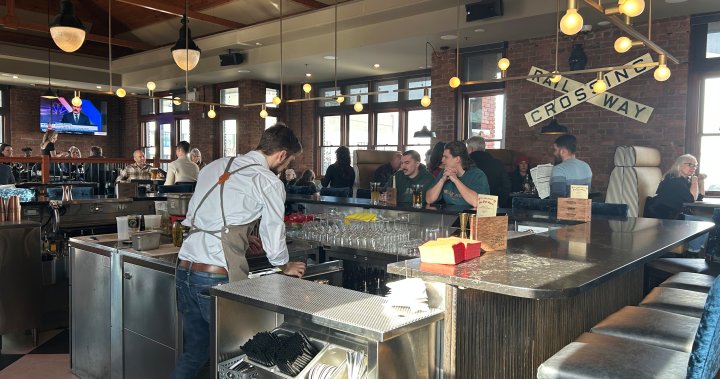Canada
Kelowna restaurants report little to no impact from 2-month GST holiday break

Valentine’s Day Rush and the GST Holiday: A Mixed Bag for Canadian Restaurants
As Valentine’s Day approached, restaurants across Canada geared up for one of their busiest nights of the year. For Erika Jane Restaurant in Kelowna, B.C., this day is typically a peak period, with more customers walking through their doors than on any other day. “Valentine’s Day, without question, more people will come through our doors than any other,” remarked David Bekkering, the managing partner of Erika Jane. The rush of love and celebration, however, wasn’t matched by the federal government’s attempt to show restaurants some love through a GST holiday. While the initiative aimed to alleviate financial pressures on the hospitality industry, the impact in B.C. was underwhelming.
The GST Holiday: A Missed Opportunity for B.C. Restaurants
The GST holiday, which ran from December 15 to February 15, was intended to boost restaurant sales by temporarily removing the 5% tax on restaurant meals. However, for many establishments in B.C., the expected surge in sales never materialized. At Erika Jane Restaurant, Bekkering noted that the absence of GST didn’t lead to a noticeable increase in sales. “We just didn’t see an uptick in sales as a direct result of not paying GST because at the end of the day, we are still paying GST on alcohol,” he explained. Similarly, Rhonda Lindsay, owner of the nearby Train Station Pub, shared that the effort to implement the program didn’t yield positive results. “The hours that we spent on programming and doing it didn’t have an impact on us in a positive way,” she said. For B.C. restaurants, the 5% tax break was too small to make a significant difference, especially during the slower winter months.
The National Picture: A Tale of Two Realities
While B.C. restaurants struggled to see the benefits of the GST holiday, the national picture painted a slightly different story. According to Restaurants Canada, restaurant transactions across the country increased by 7.6% during the two-month period. However, this growth wasn’t evenly distributed. In provinces with higher GST rates, such as Ontario (13%) and the Maritimes (15%), the impact of the tax break was more pronounced. Ian Tostenson, president and CEO of the B.C. Restaurant and Foodservices Association, pointed out that the lower GST rate in B.C. meant the holiday had limited effect. “Five per cent in this market during December and January didn’t move the needle at all,” he said. The disparity highlights the need for targeted solutions that address the unique challenges faced by restaurants in different regions.
The Road Ahead: Innovative Solutions and Community Support
Given the lukewarm response to the GST holiday, industry leaders are calling for more innovative approaches to support B.C. restaurants. Tostenson suggested expanding programs like “Dine Out or Dine Around,” which offer discounted meals during the slow winter months. These initiatives have proven successful in encouraging diners to visit restaurants during off-peak times. Additionally, Tostenson proposed creating a broader hospitality program that brings together suppliers, producers, and restaurants to promote B.C.’s culinary scene. “A program that matches suppliers, producers, restaurants…hospitality throughout British Columbia and have, if you will, an extended protracted hospitality party and make sure we keep the confidence of B.C. people,” he said. Such efforts could help restore consumer confidence and bolster the industry’s resilience against economic uncertainties.
Restaurants Get Creative to Stay Afloat
In the face of economic challenges, B.C. restaurants are pulling out all the stops to attract customers. At Erika Jane, Bekkering and his team are offering special promotions like half-priced wines and two-dollar oyster nights—ideas they might not have considered in better times. “We’re certainly offering up things we may not have in the past,” he said. These incentives are part of a broader strategy to keep doors open and prevent further closures. The restaurant industry in B.C. has already seen several establishments shut down due to financial constraints, making it more crucial than ever for businesses to find creative ways to stay afloat.
Community Support: The Lifeline for Local Restaurants
Despite the challenges, there is a silver lining. Many B.C. restaurants have managed to stay in operation thanks to the unwavering support of their communities. Lindsay of the Train Station Pub expressed gratitude for the loyalty of their customers. “We just thank the community for their support,” she said. “That is why we are still here.” As the industry navigates uncertain waters, this community backing remains a vital lifeline. For restaurants, the focus now is on building resilience, embracing innovation, and counting on the goodwill of their patrons to weather the storm. While government initiatives like the GST holiday may not have delivered the desired results, the collective effort of restaurants, suppliers, and diners offers a glimmer of hope for a brighter future.











